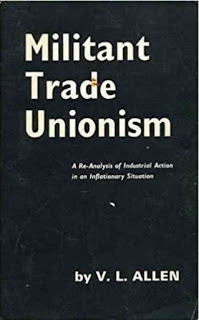 Militant Trade Unionism by V. L. Allen, Merlin press, 12s. 6d.
Militant Trade Unionism by V. L. Allen, Merlin press, 12s. 6d.
Nearly ten million workers are in trade unions in Britain yet there is a pervading air of hostility to trade unionism. Trade unions, we are told, cause inflation and disrupt production by strikes and restrictive practices. These views are shared and spread by Labour and Tory governments alike. Very rarely is a reasoned case for trade unionism put. V. L. Allen (who spent some time in jail in Nigeria recently for helping unionists there organise a general strike) attempts to do this and does it well enough. His approach is basically Marxist: In present-day society the means of production are the property of a few so that the rest, owning little but their ability to work, must sell it to an employer to live. Trade unions arise out of this market relation between employers and employees, to bargain more effectively over the wages, hours and working conditions of the employees. Strikes are built-into the system and will last as long as it does, even if they are made illegal.
The strike then is implicit in a free market transaction and any attempt to interfere with it alters the course of the transaction in favour of employers by adding another disability to employees. Every limitation on the ability to strike adds an element of compulsion on workers to sell their labour-power at prices largely set by employers.
Unofficial action is informal trade unionism occurring because formal unions are incapable of fulfilling their functions satisfactorily and have, for this reason, lost some control over their members.
Strikes are a challenge to the power and authority of employers. They challenge the prices that employers pay for labour, the profits the employers accrue from production, and their prerogative of control over the means of production.
